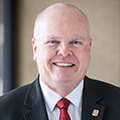Fixing a System that was Designed to Fail
A National Shortage of Primary Care Doctors
Specialists earn two to three times more than primary care doctors, creating a shortage of primary care doctors, particularly in rural and urban areas. Only 23.7 percent of doctors nationwide are practicing in federally designated, medically underserved areas (also known as medical deserts).
Because physicians tend to remain in the areas where they trained, we're building a network of urban and rural health provider partners across western Pennsylvania, eastern Ohio and other neighboring states, focusing on underserved communities. In addition, we will connect to pre-medicine pipelines to inform and attract students, particularly from underserved areas, who will choose Duquesne's medical school for their education.
Reduce Health Care Disparities
A global pandemic and social discord have turned a spotlight on social inequities that have lurked for too long. Action is not only desirable, but necessary. We're stepping up to promote the holistic well-being of the most vulnerable among us. In fact. as part of their education, Duquesne's medical school students will complete an extensive community engagement project that addresses health care disparities as part of their training.
Increasing Diversity in the Medical Profession
Physician diversity is currently limited, and issues of mistrust can arise when cultural understanding is lacking. Recent research shows that when doctors and patients share a similar ethnic background, there is a reduction in implicit bias and an improvement in health outcomes.
Innovating an insufficient and fragmented system of health care delivery.
Simply producing world class doctors will not improve health outcomes if the system that the doctors are entering is broken. We need to fundamentally change the way in which we think about health care delivery and provide innovative solutions that address and improve patient care and access.
- We will create a new institute in our Palumbo-Donahue School of Business to focus on healthcare delivery.
- We will focus on disruptive data-driven innovations that impact and improve health care service delivery.
- We will use person-centered measurements to evaluate our work.
- We will become a leader in promoting and disseminating our research to improve health care delivery systems.


